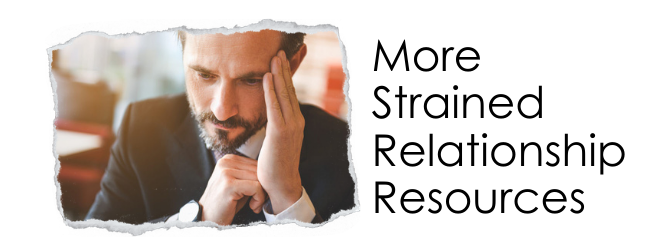
Business owners facing divorce need support, guidance and an expert sounding board to make many unplanned for personal and business decisions.
Resentment.
It’s the dreaded aftermath, the emotions that hand on, the “R” word that undermines a divorce and delays the healing process that must take place after. For business owners or partners, entrepreneurial or dual-career couples navigating separation and divorce in this day and age, the issues are increasingly complex and the stakes are high–both personally and professionally.
This is even more fraught if there are children in the picture on the personal front. If you have children how you deal with adversity will be a model for them in their lives.
On the business side how you work through your break-up or divorce can have ramifications for employees and others around you. So care for all is required. This can be extra stressful for you.
This article will show you how a good coaching can help you manage resentment in divorce so it doesn’t destroy your relationships or deplete your business in the process.
Managing resentment that oftentimes and commonly accompanies divorce, behaving with grace and dignity, and making wise decisions for the long-term benefit of everyone involved, will ultimately result in a healthy, happier you. It will preserve many relationships, allow your family to function together when occasions arise, and safeguard your business and career interests and often preserve the assets.
But how do you do it? Going through divorce is not a time to go it alone. It’s a time to seek support and guidance to work through the emotions and have a sounding board for the big decisions that will affect you, your family, and potentially your business for years to come.
Few people “decide” to be resentful. Because resentment can be an unexpected, insidious, and destructive emotion, it can catch you off guard, but there are ways to stop the resentment from taking you down the bitter road before it takes over your life.
Seek a Coach To Help Manage a Difficult Emotion
A personal divorce or business break-up is one of life’s top stressors and one of the toughest personal experiences emotionally, financially, and practically. But there are ways to get through this process with dignity, self-respect, and self-assurance. So you lessen the emotional impact on you, those around you, and you use your experience to grow.
One of these ways is learning to work through the resentment that often occurs in divorce situations. Resentment can be used as an excuse for or represent a fear of moving forward in our lives.
Not facing your feelings means they will just go “underground” and fester. It’s not that they simply go away. You need to experience and feel. But you don’t have to go it alone. Do it with support. Then talking it over. And maybe over, in a safe supportive environment is needed. Along with tools for managing it all. These are all so important for getting to the “other side” of the difficult situations in your life. And divorce is certainly one of them.
Getting stuck in resentment means no growth, fewer new and exciting adventures, less time to feel the real feelings of loss and heal. So you move forward in your life.
Freeing yourself from those insidious feelings of resentment is easier said than done, but it definitely can be done. It takes time and support. I’d definitely recommend seeking a good coach who understands all the ramifications of what you are going through—personally and professionally—to help you navigate the many changes that a break-up or divorce brings about.

Divorce is stressful on so many levels. Business owners and high performing career professionals do better with coaching support and guidance when facing divorce and transitioning to new life.
Benefits of Taking Resentment Out of Your Divorce
In the meantime, let’s look at some of the benefits of taking resentment out of the divorce formula:
You’ll Feel Better Physically
Resentment is an aspect of anger that can eat you alive, from the inside out–not a pretty picture for sure. It can make you physically ill, cause self-inflicted stress responses, and leave you exhausted. Take it away and you just plain feel better physically.
You’ll Think More Clearly
No one thinks well in the grips of the strong and overpowering feelings of anger and resentment. How can you negotiate for yourself, your children, your financial future, or your peace of mind when you are blinded by anger and resentment? Your resentment at your partner or life in general, no matter how justified, will absolutely not get you what it is you need and want from this parting of ways. In fact, it can actually make your situation worse.
You’ll Avoid Being Emotionally Stuck
Getting stuck in resentment of what could have, should have, or would have been a recipe for long-term bitterness and an inability to move ahead in your own life. Of course, you will experience sadness, anger, grief, and many other emotions during a very difficult time. And rightly so, as divorce is a loss, and loss equals grief and grief must be attended to. But there is no healing from grief if you allow resentment to block your way.
You’ll Be A Better Parent
The studies are all conclusive: the worst-case scenario for children of divorce is an acrimonious divorce. Acrimonious divorces are almost always built on the unsteady house of resentment cards. Children watch and learn from you at every turn. Teach them how to handle adversity with grace and dignity. And although they may see you sad, tearful, and even angry at times, teach them how to live through and handle appropriate emotions, rather than be stuck in the quagmire of bitterness.
You’ll Function Better At Work
So much of life asks you to shut off one part of yourself to function at the office. This may be especially true if you are the business owner, and it’s more complex if you own the business, run the business or work together. While it’s complicated and often requires outside support and coaching, aligning yourself and your intentions behind your values of preserving relationships where it is healthy and respectfully disengaging from those that can no longer go on is highly important for healing in the long run. It will also help you to make careful decisions that preserve the personal and work aspects you value.
You’ll Communicate More Compassionately
Especially if you have children, houses, maybe even businesses, communicating compassionately paves the way for better negotiations during and long after a divorce. I’ve coached many business owners and career professionals who have worked together to ensure that everyone in the family is cared for, and both adults’ futures are secure. But he takes maturity and care during the negotiations. When resentment is in the forefront chances are you’ll make decisions that backfire or you’ll regret later.

There are choice points in how you respond to the resentment that is normal in a divorce.
Managing the Resentment When It Arises
So just how do you manage your resentment, and what do you do with it when it surfaces? How do we make sense of this destructive emotion so that we can feel, think and be better in our lives despite the loss we may be feeling? Of course, there is no magic formula, but these tips might help you on this journey.
-
Recognize and name your emotions
Start with asking yourself regularly, what am I feeling right now? Maybe you are very sad because you think of what might have been, or what was or wasn’t a part of your relationship. Perhaps you are angry that life has worked out this way. You could be relieved that the relationship is ending because it was so emotionally draining. Or you may harbor resentment because your partner has moved on to someone else while you have no one. Get some clarity on what you are feeling.
2. Express yourself
Once you have identified what you are feeling, the next step in getting through any loss is talking about it. You can talk with a professional, or you can use a journal or talk to a positive friend. The more true real feelings you can get out, the more steps you are taking to working your way through this divorce process – the key is to get them out in an appropriate place. This would not include through your children, in the talks with your partner about the practicalities of who gets what or in the legal system. One very positive and beneficial way to do this is with the help of a divorce mediator or collaborative divorce process that focuses on divorce with dignity and integrity.
3. Ask yourself this question
How is this resentment I am feeling helping me right now? Most of the time you will find that it is hurting, not helping you. Granted, it is easy to fall into the pit of resentment, because, after all, emotions are running high. But resentment takes the power away from you and gives it to your partner by letting your partner’s actions or lack of actions (which, by the way, you have no control over) decide how you are going to feel. Take your power back.
4. Be emotionally intelligent
Yes, there is such a thing. It means that you are able to acknowledge, accept, feel, manage and place your emotions in the proper perspective. Shouting your anger during the legal meeting is not the right place. Telling your children that your partner is not a good person because you resent his or her leaving, not leaving, taking, not caring, having a new car, or a new partner is damaging to your children, but also to you and how your children will view you in the future.
5. Remember the bottom line
This is a parting of the partnership, the end of a special relationship and it is painful. The goal is to work through all the feelings, sort through the practicalities, build up your self-confidence, grow because of your experience, and move forward to be the best person you can be. Then there will be new goals for you, a new relationship, perhaps, or a better career, or a freedom that you may grow to like. Picture yourself in three years, five or even ten. Do you choose to see a bitter, resentful, angry person filled with despair? Or do you choose to see a vibrant, wiser, fulfilled, and happy person with a new, exciting, and hopeful life?
This is not easy to do when you are going through a life-changing transition like a divorce. Either way, but especially if it is not your choice. Please reach out for coaching, support, and guidance during this difficult time. It will save you lots of extended grief so you can move forward.

RELATED ARTICLES
- How a Good Coach Can Help You Manage Resentment in Divorce So It Doesn’t Destroy Your Relationships and Deplete Your Business
- Couple Communication During and After Divorce: Tips To Stay Non-Reactive With Your Ex
- If Divorce Seems Inevitable, Here’s Where to Start
- Appropriate Referrals to an Outside Coach or Therapist in a Collaborative Divorce Process
- How to Survive Living Together, When You Want to Divorce
- The Role of Goal Setting in a Healthy Divorce Process
Additional Resources
When You Are Ready—Reach Out for a Complimentary Call to Explore Your Needs here
- You Want to Grow But Your Business Has Stalled Out — It’s Time For a Reset - January 7, 2025
- Three Ways to Advance Your Career - October 7, 2024
- How to Take Your Business to the Next Level - October 3, 2024
